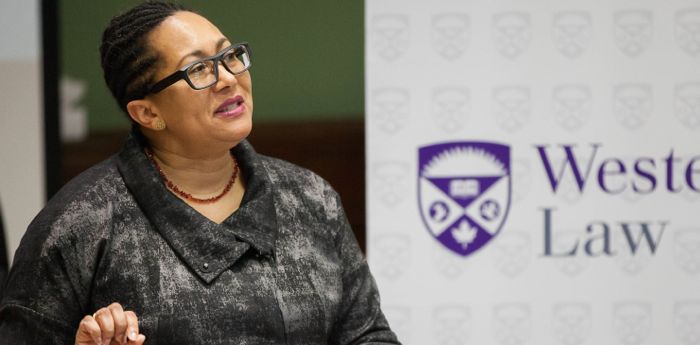Coxford lecture examines the justice and jurisprudence of reparations
June 12, 2015
 In her 2015 Coxford Lecture, Professor Adrienne Davis posed the question what, if anything, can the law do to undo the wrongs and harms of slavery?
In her 2015 Coxford Lecture, Professor Adrienne Davis posed the question what, if anything, can the law do to undo the wrongs and harms of slavery?
Davis, the Vice-Provost and William M. Van Cleve Professor of Law at Washington University in St. Louis, delivered the annual public law lecture to a full house at Western Law on March 3.
She discussed the issue of reparations for the wrongs associated with the system of slavery in the United States and explored various models of black reparations, including restorative, corrective and transitional justice.
“Her talk brought together reflections on the history of slavery, public and private law doctrine, and legal theory in a remarkable way,” said Professor Andrew Botterell, the lecture organizer.
Davis first outlined the idea that the wrongs of slavery can be remedied in the way in which other private wrongs are remedied, namely by the payment of compensatory damages.
Just as the victim of a battery might sue in tort, seeking damages for the violation of her right to bodily integrity, so it might be thought that the descendants of slaves should be able to sue others – slave-owners or their descendants, or perhaps the government of the United States – for the wrongs inflicted by slave-owners on the victim’s ancestors.
But Davis rejected this general approach to reparations on the grounds that the so-called private law, or corrective justice, model is inadequate to fully account for the wrongs of slavery and because it is not clear on that model whether descendants of slaves have standing to sue.
“The Corrective justice model misconceives the fundamental injuries of slavery,” she argued. “The model turns to the market as opposed to the criminal system or political process to rectify injuries and vindicate entitlements.”
Davis explored principles of transitional justice and argued that in a very real sense the United States has never fully come to terms with its history of slavery, and as a result has not fully transitioned from an illiberal to a liberal state.
In short, Davis said, the animating principles of Reconstruction have never fully been embraced and adopted, from which it follows that the “United States is in an important sense an unfinished democratic project.”
She concluded that the best lens through which to view the wrongs and harms of slavery is that of transitional justice.
“Transitional Justice is fundamentally about the political identity of states and their members,” she said. “Final responsibility lies with the state.”
“To my mind,” Botterell said, “Professor Davis’ lecture reflected everything that makes her scholarship so exciting and challenging, including its attention to historical detail and its recognition of the importance of thinking about the nature of justice in new ways.”
“Western Law is fortunate to have been able to host Professor Davis, and especially lucky to have a venue like the Coxford Lecture in which academics and jurists can discuss issues of contemporary importance and controversy,” he added.
The annual Coxford lecture is generously supported by Western Law alumnus Stephen Coxford ’77.






